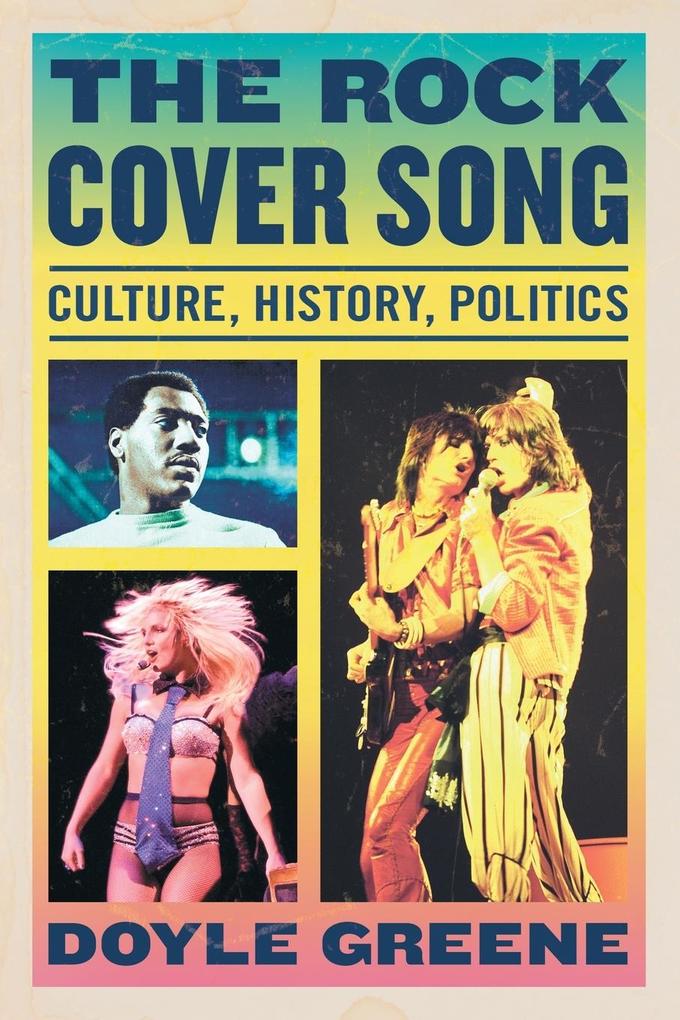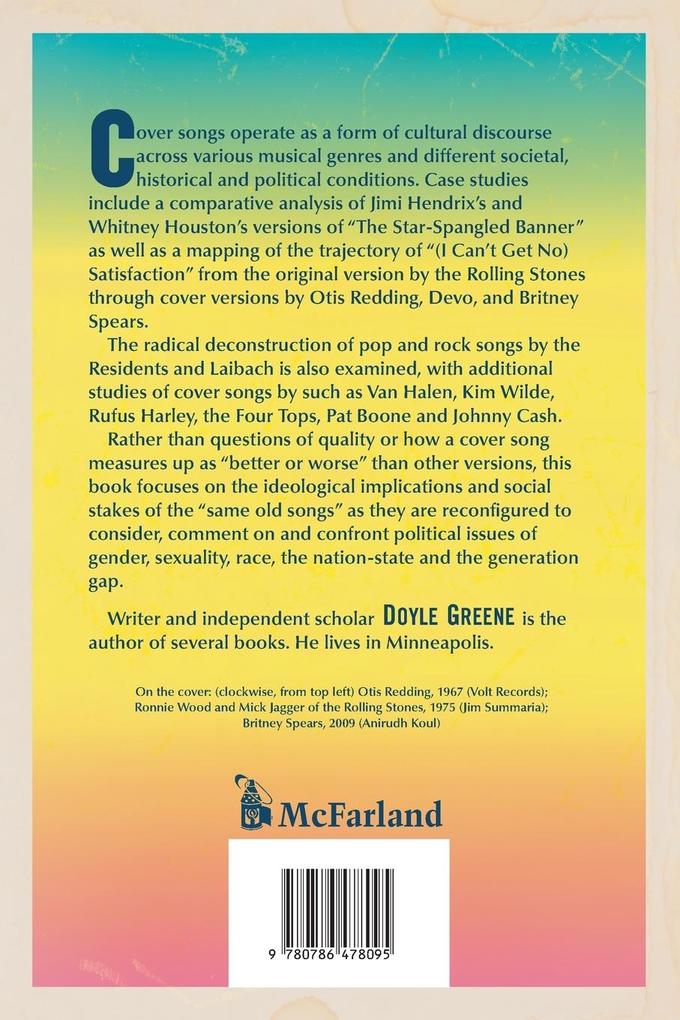Bücher versandkostenfrei*100 Tage RückgaberechtAbholung in der Wunschfiliale

Zustellung: Mi, 18.06. - Sa, 21.06.
Versand in 6 Tagen
VersandkostenfreiBestellen & in Filiale abholen:
Cover songs operate as a form of cultural discourse across various musical genres and different societal, historical and political conditions. Case studies include a comparative analysis of Jimi Hendrix's and Whitney Houston's versions of "The Star-Spangled Banner" as well as a mapping of the trajectory of "(I Can't Get No) Satisfaction" from the original version by the Rolling Stones through cover versions by Otis Redding, Devo, and Britney Spears.
The radical deconstruction of pop and rock songs by the Residents and Laibach is also examined, with additional studies of cover songs by such as Van Halen, Kim Wilde, Rufus Harley, the Four Tops, Pat Boone and Johnny Cash.
Rather than questions of quality or how a cover song measures up as "better or worse" than other versions, this book focuses on the ideological implications and social stakes of the "same old songs" as they are reconfigured to consider, comment on and confront political issues of gender, sexuality, race, the nation-state and the generation gap.
The radical deconstruction of pop and rock songs by the Residents and Laibach is also examined, with additional studies of cover songs by such as Van Halen, Kim Wilde, Rufus Harley, the Four Tops, Pat Boone and Johnny Cash.
Rather than questions of quality or how a cover song measures up as "better or worse" than other versions, this book focuses on the ideological implications and social stakes of the "same old songs" as they are reconfigured to consider, comment on and confront political issues of gender, sexuality, race, the nation-state and the generation gap.
Inhaltsverzeichnis
Table of Contents
Acknowledgments
Preface
Introduction: The Song Doesn't Remain the Same
"Reading" through Listening
Covering Cover Songs
Part One-Judging a Song by Its Cover
1. National Anthems: "The Star-Spangled Banner" Jimi Hendrix (Woodstock, 1969)
Whitney Houston (Super Bowl XXV, 1991)
2. The "Anti-Cover": Punk and the Avant-Garde
Sid Vicious: "My Way" (The Great Rock 'n' Roll Swindle, 1980)
The Residents: The Third Reich and Roll (1976)
Hardcore and the Anti-Cover
Part Two-Anatomy of a Cover: "(I Can't Get No) Satisfaction"
3. "Satisfaction" and Rock: The Rolling Stones (Out of Our Heads, 1965)
The Anti-Beatles
"Satisfaction" as Manifesto
Under My Thumb: Altamont and Rock Totalitarianism
4. "Satisfaction" and Soul: Otis Redding (Otis Blue/Otis Redding Sings Soul, 1965)
Paint It Black: Race and Rock in the 1960s
Soul Brands: Motown and Stax
"Satisfaction" as Protest
5. "Satisfaction" and Punk: Devo (Q: Are We Not Men?
A: We Are Devo!, 1978)
A Postmodern Protest Band (or, Anarchy in Akron)
"Satisfaction" as Deconstruction
Marketing Opposition
6. "Satisfaction" and Pop: Britney Spears (Oops! ... I Did It Again, 2000)
The Lolita Next Door
Blonde Alienation
"Satisfaction" as Commodity
Part Three-Signs of the Times: Cover Songs in Context
7. Music from the Waist Down: Covers, Gender and Sexuality
King Curtis: "Whole Lotta Love" (Single, 1970)
Van Halen: "You Really Got Me" (Van Halen, 1978)
The Flying Lizards: "Sex Machine" (Top Ten, 1984)
Kim Wilde: "You Keep Me Hangin' On" (Another Step, 1986)
8. Black Musicians, White Songs: Race and Covers in the Late
Counterculture
Rufus Harley: "Where Have All the Flowers Gone?" (Recorded
in 1969; Released on Courage: The Atlantic Recordings, 2006)
The Isley Brothers: "Ohio/Machine Gun" (Givin' It Back, 1971)
The Four Tops: "A Simple Game" (Single, 1972)
9. Dance with Laibach: Covers and the Critique of the Nation-State
The Laibach Project
NATO (1994)
The Dilemmas of Laibach
10. In with the Old: Covers and Generational Politics
The Midlife Crisis of Rock and Roll
Frank Sinatra: "Something" (Single, 1970)
"So Bad It's Good": Covers and Camp
Pat Boone: "Smoke on the Water" (In a Metal Mood: No More
Mr. Nice Guy, 1997)
Johnny Cash: "Hurt" (American IV: The Man Comes Around,
2002)
Conclusion: The Politics of Listening
Chapter Notes
Bibliography
Index
Acknowledgments
Preface
Introduction: The Song Doesn't Remain the Same
"Reading" through Listening
Covering Cover Songs
Part One-Judging a Song by Its Cover
1. National Anthems: "The Star-Spangled Banner" Jimi Hendrix (Woodstock, 1969)
Whitney Houston (Super Bowl XXV, 1991)
2. The "Anti-Cover": Punk and the Avant-Garde
Sid Vicious: "My Way" (The Great Rock 'n' Roll Swindle, 1980)
The Residents: The Third Reich and Roll (1976)
Hardcore and the Anti-Cover
Part Two-Anatomy of a Cover: "(I Can't Get No) Satisfaction"
3. "Satisfaction" and Rock: The Rolling Stones (Out of Our Heads, 1965)
The Anti-Beatles
"Satisfaction" as Manifesto
Under My Thumb: Altamont and Rock Totalitarianism
4. "Satisfaction" and Soul: Otis Redding (Otis Blue/Otis Redding Sings Soul, 1965)
Paint It Black: Race and Rock in the 1960s
Soul Brands: Motown and Stax
"Satisfaction" as Protest
5. "Satisfaction" and Punk: Devo (Q: Are We Not Men?
A: We Are Devo!, 1978)
A Postmodern Protest Band (or, Anarchy in Akron)
"Satisfaction" as Deconstruction
Marketing Opposition
6. "Satisfaction" and Pop: Britney Spears (Oops! ... I Did It Again, 2000)
The Lolita Next Door
Blonde Alienation
"Satisfaction" as Commodity
Part Three-Signs of the Times: Cover Songs in Context
7. Music from the Waist Down: Covers, Gender and Sexuality
King Curtis: "Whole Lotta Love" (Single, 1970)
Van Halen: "You Really Got Me" (Van Halen, 1978)
The Flying Lizards: "Sex Machine" (Top Ten, 1984)
Kim Wilde: "You Keep Me Hangin' On" (Another Step, 1986)
8. Black Musicians, White Songs: Race and Covers in the Late
Counterculture
Rufus Harley: "Where Have All the Flowers Gone?" (Recorded
in 1969; Released on Courage: The Atlantic Recordings, 2006)
The Isley Brothers: "Ohio/Machine Gun" (Givin' It Back, 1971)
The Four Tops: "A Simple Game" (Single, 1972)
9. Dance with Laibach: Covers and the Critique of the Nation-State
The Laibach Project
NATO (1994)
The Dilemmas of Laibach
10. In with the Old: Covers and Generational Politics
The Midlife Crisis of Rock and Roll
Frank Sinatra: "Something" (Single, 1970)
"So Bad It's Good": Covers and Camp
Pat Boone: "Smoke on the Water" (In a Metal Mood: No More
Mr. Nice Guy, 1997)
Johnny Cash: "Hurt" (American IV: The Man Comes Around,
2002)
Conclusion: The Politics of Listening
Chapter Notes
Bibliography
Index
Produktdetails
Erscheinungsdatum
01. März 2014
Sprache
englisch
Seitenanzahl
216
Autor/Autorin
Doyle Greene
Verlag/Hersteller
Produktart
kartoniert
Gewicht
358 g
Größe (L/B/H)
229/152/13 mm
ISBN
9780786478095
Entdecken Sie mehr
Bewertungen
0 Bewertungen
Es wurden noch keine Bewertungen abgegeben. Schreiben Sie die erste Bewertung zu "The Rock Cover Song" und helfen Sie damit anderen bei der Kaufentscheidung.










